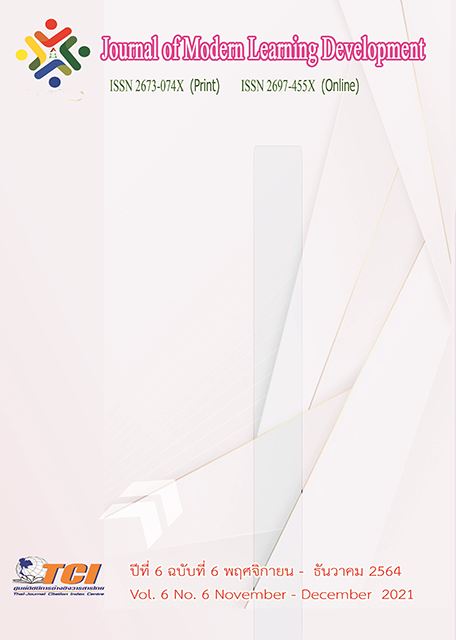Comparison of Academic Achievement of SS 2203101 Physical Geography of Social Studies among 1st Undergraduate Students between Student Teams-Achievement Divisions (STAD) and Conventional Learning Management
Main Article Content
Abstract
This research aimed to compare academic achievement before and after taking SS 2203101 Physical Geography and to compare satisfaction among fist year undergraduate students in Department of Social Studies who were taught under Student Teams-Achievement Divisions (STAD) strategy and conventional learning management strategy. A sample of 60 1st year undergraduate students under Department of Social Studies, Faculty of Humanities and Social Sciences, Thepsatri Rajabhat University, Lop Buri Province who took SS 2203101 Physical Geography in second semester of academic year 2020, selected by using a purposive sampling technique. Research instruments included STAD-based lesson plans and conventional learning management-based lesson plans (16 sheets per plan), achievement test in a form of multiple choices and essay test, study satisfaction survey with a five-point rating scale: very high, high, moderate, low, and very low. Statistics used in analysis include average, standard deviation, and dependent and independent t-test.
Research findings are
1. Students who studied with the STAD strategy had higher academic achievement than those who studied with conventional learning management strategy at the statistically significant level of .05
2. Students who studied with the STAD strategy had higher satisfaction than those who studied with conventional learning management strategy at the statistically significant level of .05
Article Details
References
กระทรวงศึกษาธิการ. (2560). คู่มือการใช้หลักสูตรสังคมศึกษา พ.ศ. 2551 ตามหลักสูตรแกนกลางการศึกษาขั้นพื้นฐาน พ.ศ. 2551. กรุงเทพมหานคร: โรงพิมพ์ชุมนุมสหกรณ์การเกษตรแห่งประเทศไทยจำกัด.
ทิศนา แขมมณี. (2553). ศาสตร์การสอน : องค์ความรู้เพื่อการจัดกระบวนการเรียนที่มีประสิทธิภาพ.
(พิมพ์ครั้งที่ 13). กรุงเทพมหานคร: จุฬาลงกรณ์มหาวิทยาลัย.
วัชรีพร สุทธิกรกมล. (2559). ผลการจัดกิจกรรมแบบกลุ่มร่วมมือด้วยเทคนิค STAD เพื่อพัฒนาการอ่านจับใจความภาษาอังกฤษเพื่อธุรกิจการท่องเที่ยวและการโรงแรม. รายงานผลการวิจัย. มหาวิทยาลัยธุรกิจบัณฑิตย์.
วัลยา บุญอากาศ. (2556). ผลการจัดการเรียนรู้แบบร่วมมือเทคนิค STAD ที่มีต่อผลสัมฤทธิ์ทางการเรียน และทักษะการคิดวิเคราะห์วิชาคณิตศาสตร์ของนักเรียนชั้นประถมศึกษาปีที่ 6. วิทยานิพนธ์หลักสูตรครุศาสตรมหาบัณฑิต สาขาหลักสูตรและการสอน. บัณฑิตวิทยาลัย: มหาวิทยาลัยราชภัฎรําไพพรรณี.
สำนักงานคณะกรรมการพัฒนาการเศรษฐกิจและสังคมแห่งชาติ. (2560). แผนพัฒนาเศรษฐกิจและสังคมแห่งชาติ ฉบับที่สิบสอง พ.ศ. 2560 – 2564. กรุงเทพมหานคร: สำนักงานคณะกรรมการพัฒนาการเศรษฐกิจและสังคมแห่งชาติ สำนักนายกรัฐมนตรี.
สุวิทย์ มูลคํา และคณะ. (2554). การจัดกิจกรรมการเรียนรู้ที่เน้นการคิด. กรุงเทพมหานคร: อี เค บุ๊คส์.
อุษา ยิ่งนารัมย์. (2552). การเปรียบเทียบผลการเรียนรู้วิชาคณิตศาสตร์ เรื่องระบบสมการเชิงเส้นสองตัวแปร ของนักเรียนชั้นมัธยมศึกษาปีที่ 3 ที่ได้รับการสอนโดยวิธีเรียนแบบร่วมมือแบบ STAD กับการสอนแบบปกติ. วิทยานิพนธ์ กศ.ม. (การวิจัยการศึกษา). บัณฑิตวิทยาลัย: มหาวิทยาลัยมหาสารคาม.
Slavin, E Robert. (1989). “STAD,” Journal of Research and Development in Educational. 60 (7), 42 - 48.


